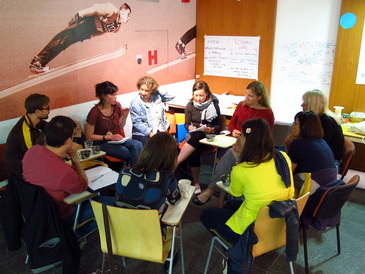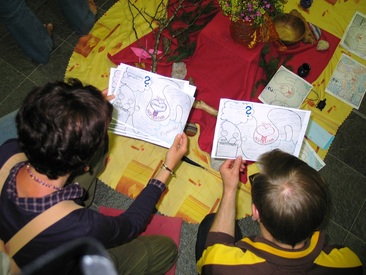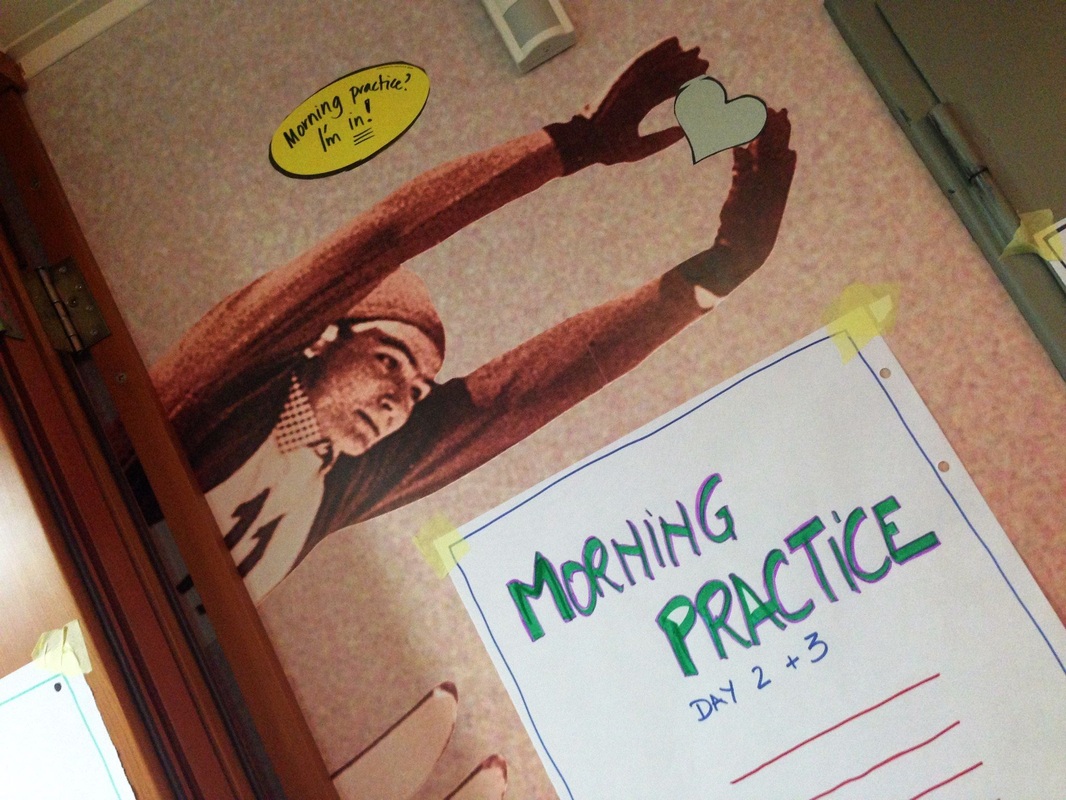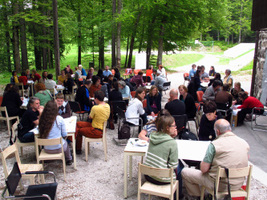Day 1: WELCOMING (TRUST, HOPE AND SELF-CONFIDENCE)
PROCESS
10:15 Welcome, Framing
10:35 Check In (What in your life inspired you to be present here?) 11:15 World Café 12:45 Sign-up Matrix 13:00 Lunch 14:00 Teaching (The Chaordic Path, the 5th organisational paradigm, the Breath Pattern) 15:00 Open Space (What meaningful questions am I here to explore?) 18:00 Village news 18:15 Check Out 19:30 Preparation time |
SUMMARY OF THE DAYThis training in the Art of Participatory Leadership took place in the beautiful mountainous valley at the ski Olympic center in Planica. Our journey began at the foot of the mountains and participants were challenged to ask them themselves if they were ready to jump into the learning space; a place where there are no tourist or spectators and in which everybody is invited to be a practitioner.
The core themes of the first day were self-confidence and trust. In the introductory Check In almost 70 people shared what inspired them to be present at the training. Core methods experienced on this first day included World Café and Open Space. We enjoyed Checking Out by expressing our feelings at the end of the day with a single word accompanied by a gesture. |
World Café harvest
|
The first conversation that the participants were invited to was in the World Café format, along the following three powerful questions:
"Courage to trust each other; give space to the new; courage from the heart to trust our own power, so we can leave our comfort zone; be me, sincerely; courage to love and to be loved," were some powerful insights from the World Café. |
World Café gallery |
Open Space harvest

The overarching question in the Open Space: "What meaningful questions am I here to explore?"
Some of the topics explored:
• How to share leadership roles when people rely on you too much?
• How to switch the paradigm of leadership to the paradigm of hosting?
• How to empower leadership of change?
• How do you start a big social project? Where and how…?
• How to make a shift in the world towards an inclusive, nonjudgmental one?
• How to love yourself and others truly, deeply and authentically?
• How to obtain real listening and “provoke” empathy in the group?
• How to use participatory approaches in hierarchical bureaucratic organizations?
• How to engage groups that are not engaged?
• How to host/engage people that have hard time communicating (children, disabled groups,…)?…
Some of the topics explored:
• How to share leadership roles when people rely on you too much?
• How to switch the paradigm of leadership to the paradigm of hosting?
• How to empower leadership of change?
• How do you start a big social project? Where and how…?
• How to make a shift in the world towards an inclusive, nonjudgmental one?
• How to love yourself and others truly, deeply and authentically?
• How to obtain real listening and “provoke” empathy in the group?
• How to use participatory approaches in hierarchical bureaucratic organizations?
• How to engage groups that are not engaged?
• How to host/engage people that have hard time communicating (children, disabled groups,…)?…

Some hope and inspiration messages that were harvested in the Open Space:
• Create safe space and accept diversity.
• Share small stories of transformation and change.
• Don t think why (=ratio); think/look what you see/hear/feel. Ask others about this too.
• Share with present leaders hosting principles and practices.
• If you want to change the organization, be yourself.
• Don t attempt to break habits. Be gentle and honest. Change perspective, create new habits.
• Just start doing something, you don t have to have the whole plan.
• Stop labeling. Multiple identities. Mutual recognition of each other’s strengths. Transformation from within.
• Authentic self-love beams into life.
• We often feel guilty. Acceptance is the key
• Distinguish opinions and being.
• We have no idea how self-loving society would look like?
• If others trust us, it helps.
• Other people reflect our self-love.
• Self-empathy can’t be taught, it must be lived.


